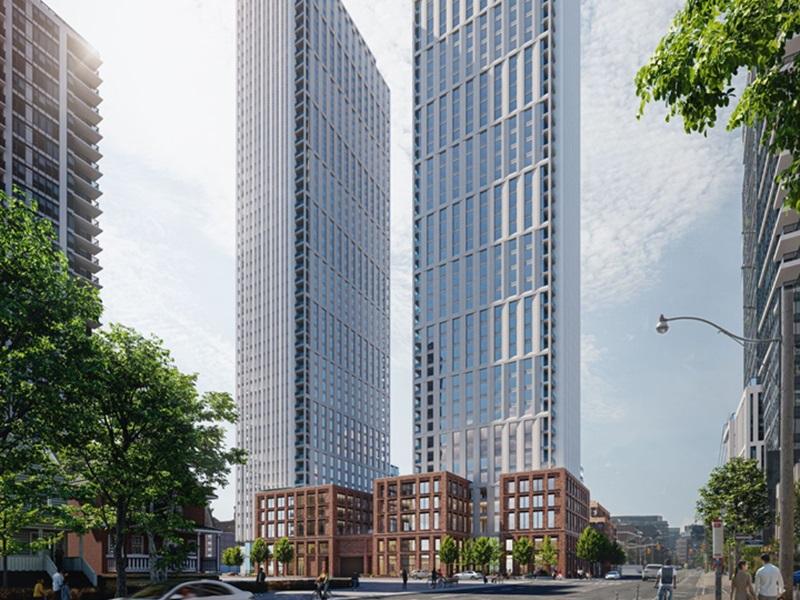 The number of transactions for high-density development land in the Greater Toronto Area (GTA) continue to plummet, according to the Q2 - 2023 GTA High Rise Land Insights Report from Bullpen Research & Consulting Inc., and Batory Management.
The number of transactions for high-density development land in the Greater Toronto Area (GTA) continue to plummet, according to the Q2 - 2023 GTA High Rise Land Insights Report from Bullpen Research & Consulting Inc., and Batory Management.
The report also notes the average estimated land price on a per-buildable-square-foot basis – $77 – was the lowest since the first GTA High-Rise Lands Insights Report was published in Q4 2017.
The market for new condominiums in the GTA has softened significantly over the past year due to the 10 interest rate hikes by the Bank of Canada – and there is an expectation of at least one more hike to come.
Despite the slowdown, however, there is still demand and the sector has shown the ability to bounce back in a big way from downturns over the past 25 years, according to the report's author.
“Sales are considerably down and the 10 interest rate hikes have really taken a bite out of pre-construction demand,” Bullpen president and owner Ben Myers told RENX.
“Because demand is down, there's a reluctance to buy properties. The carrying cost is much higher and there’s uncertainty about the long-term prospects in the market.
“There are still transactions happening, just not at the same pace as when the market was booming.”
Bullpen is a residential market research and advisory firm, while Batory is a land-use planning and project management company.
Prices and activity lower in 416 and 905 area codes
The $77 per-buildable-square-foot figure in Q2 2023 was 19 per cent lower than the same period in 2022 and 31 per cent lower than in 2021.
The price-per-buildable-square-foot was down in both the traditional 416 pre-amalgamated Toronto and 905 suburban area codes.
The number of high-density land transactions was down for the fifth straight quarter. The 19 acquisitions which took place matched the lowest level of activity since the third quarter of 2018.
The 19 transactions were for land that averaged one acre in size and sold for about $17.3 million. The average potential multiresidential development that can be built on the sites averages 32 storeys, according to the report.
There’s been a lack of land transactions in high-end areas such as Yorkville or along the Lake Ontario waterfront so there were no properties pulling the average land price up.
No land transactions with full zoning approvals
There were also no land transactions with full zoning approvals in place during the second quarter as developers aren’t willing to pay a premium for sites that are shovel-ready due to uncertainty in the short-term market.
“Typically, people buy those because the entitlement risk or the planning risk has been removed from the properties and they can bring them to market faster,” Myers explained.
“There’s no rush for anyone to bring a property to market right now for sale, or for rent, despite the fact that rents are booming.”
Many new condo units that are selling are doing so at price levels from two years ago, according to Myers. Developers who can’t get their costs in line with those revenue levels won’t launch a new project.
Many developers remain confident regarding the long-term viability of the new condo and rental apartment markets and are buying sites where they believe they can add value through the entitlement process, with an eye to launching sales in three to four years.
Few distress sales
Land owners seem satisfied to hold onto what they have if they can’t get the price they want, confident their prospects will improve in the future.
So far, there has not been a rush of distressed vendors in a position where they almost have to sell, nor has there been a substantial increase in power-of-sale transactions, according to public listings from top commercial real estate brokerages.
Myers had expected more developers who bought land at peak prices – in anticipation of getting approvals and launching a new condo as soon as possible – looking to unload that property because their plans have fallen through.
That could have caused a crash in land prices instead of having them trending slowly downward.
He did warn, however, that more distress sales could happen in 2024.
After consistently strong price growth in the new condo market throughout the past two decades, developers are now more carefully assessing where prices may head and considering the pre-construction investor landscape over the next five years since the market is dominated by investors.
“If developers can’t maintain a reasonable profit margin, they’re just not going to launch,” Myers said.
Significantly fewer new condo unit sales expected
New condo unit sales in the GTA have averaged almost 22,000 annually over the past 10 years, including a near-record high 30,901 in 2021, according to Urbanation Inc.
Myers believes unit sales could drop to between 12,000 to 14,000 this year.
Some developers are considering building purpose-built rentals instead of condos.
“They understand the condo market because that's the one they've been operating in and the value still makes more sense to them to do a condominium instead of rental in terms of their return and how long it takes to get the return,” Myers noted.
“So I think the preference for many people that have been long-time condo developers is to stay in that space, but they’re considering rental because there seems to be much more political support for rental versus ownership housing.
“There’s a willingness to defer or significantly decrease development charges or to fast-track rental development.”
The Ontario government has put a big push on getting more housing built, but any policy measures introduced at the provincial and municipal levels to increase supply have been more than offset by interest rate hikes.
The report says housing undersupply will continue to be a big issue and pricing will eventually trend back up despite the mini-correction – which might still lead to further decreases.










